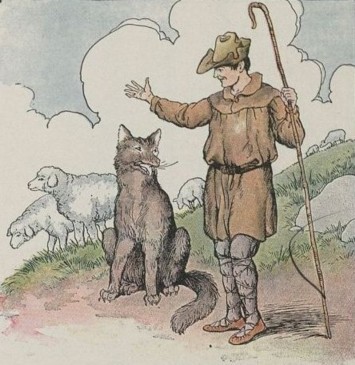PART A_1
Let’s learn vocabulary. Listen and repeat the words and the sentences with your tutor.
PART A_2
| 1. anxiously | /ANK-shes-li/ |
| -in an anxious way | |
| She roamed around the room anxiously after hearing the bad news. | |
| 2. harm | /harm/ |
| -hurt or damage | |
| She meant no harm to the kids when she approached them. | |
| 3. wicked | /WIK-id/ |
| -extremely bad and morally wrong | |
| The wicked witched injured everyone in the town. | |
| 4. foolish | /FU-lish/ |
| -stupid and not wise | |
| The foolish act of the landowner caused her the loss of her property. | |
| 5. prowl | /prawl/ |
| -to move around quietly in a place trying not to be seen or heard, such as an animal does when hunting | |
| The fox is prowling while trying to look for his next prey. |
PART B_1
Let’s read the story. Please read it aloud, and I will check your pronunciation and intonation.
PART B_2
The Wolf and the Shepherd

A Wolf had been prowling around a flock of Sheep for a long time, and the Shepherd watched very anxiously to prevent him from carrying off a Lamb. But the Wolf did not try to do any harm. Instead, he seemed to be helping the Shepherd take care of the Sheep. At last, the Shepherd got so used to seeing the Wolf that he forgot how wicked he could be.
One day he even went so far as to leave his flock in the Wolf’s care while he went on an errand. But when he came back and saw how many of the flock had been killed and carried off, he knew how foolish to trust a Wolf.
Once a wolf, always a wolf.
PART C_1
Let’s answer comprehension questions. Please answer them based on the story.
PART C_2
| 1. | What did the shepherd do when the wolf was prowling? |
| 2. | Why was the shepherd able to trust the wolf? |
| 3. | What happened to the flock of sheep? |
PART D_1
Let’s discuss the story. Please answer the questions below and express your opinions.
PART D_2
| 1. | Do you think the wolf has planned everything? Why or why not? |
| 2. | Do you think it was right for the shepherd to trust the wolf? Why or why not? |
| 3. | What do you think the shepherd felt after seeing that many of his flock had been killed and eaten? |
| 4. | Do you agree with the moral of the story? Why or why not? |
| 5. | Do you think people are capable of changing? Why or why not? |
REVIEW AND FEEDBACK
Now, let us review the things that you learned in this lesson.
ではこのレッスンで学んだことを振り返りましょう。
(Please give a short feedback on how your student did on your class.)
| Grammar 文法 |
Pronunciation 発音 | Vocabulary 単語 |
Comprehension 理解 |
|
|---|---|---|---|---|
 GOOD GOOD |
文法の誤りはほとんどなく、完全な文章で話すことができる | ほとんどの単語をはっきりと正しく発音することができる | 習った表現を適切に使うことができる | 文章を理解し、質問に正しく答えることができる |
 FAIR |
文法の誤りはあるが、完全な文章で話すことができる | 発音の練習が必要な言葉がいくつかある | たまにミスはあるが、習った表現を適切に使うことができる | 文章を完全に理解するのは難しく、質問に正しく答えられないときもある |
 POOR |
文章で話すのは難しく、単語だけで話すことができる | 発音の練習が必要である | 習った単語と表現を少しだけ使うことができる | 文章を理解するのは難しく、質問に答えるのは難しい |
Parts of this lesson material are based on:
An eBook from The Project Gutenberg.
This eBook is for the use of anyone anywhere at no cost and with almost no restrictions whatsoever. You may copy it, give it away or re-use it under the terms of the Project Gutenberg License included with this eBook or online at www.gutenberg.org
An eBook from The Project Gutenberg.
This eBook is for the use of anyone anywhere at no cost and with almost no restrictions whatsoever. You may copy it, give it away or re-use it under the terms of the Project Gutenberg License included with this eBook or online at www.gutenberg.org